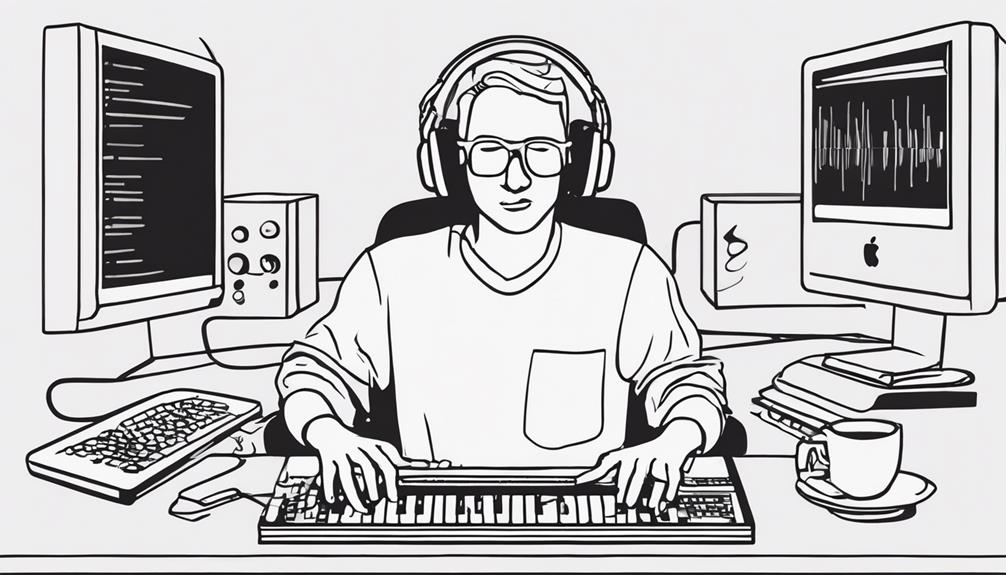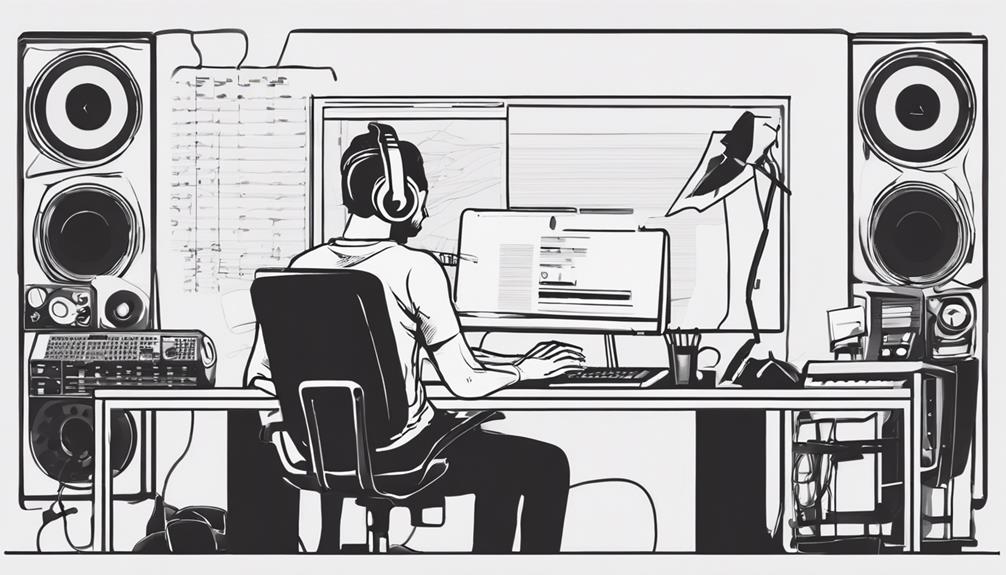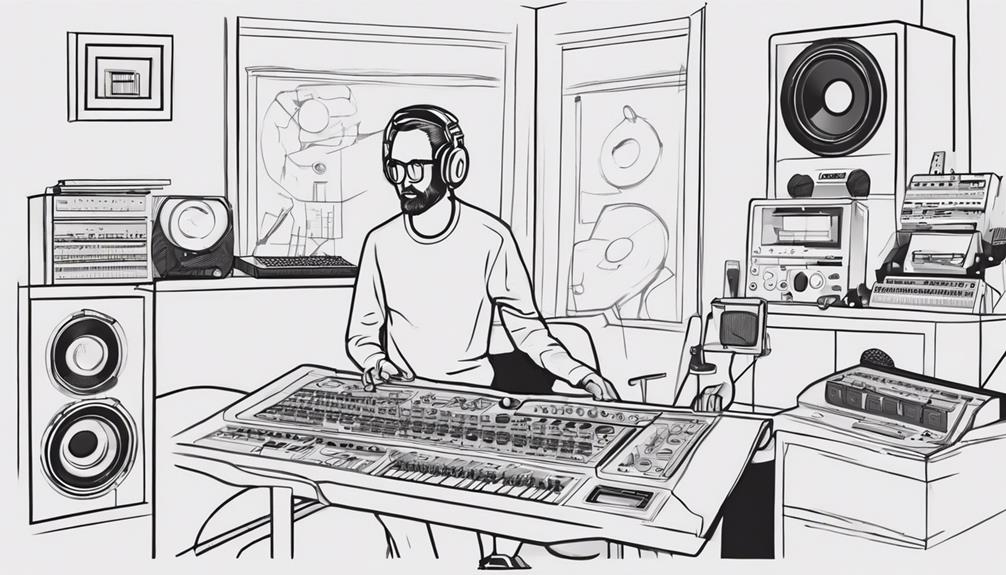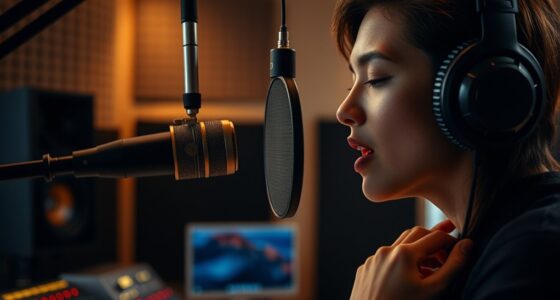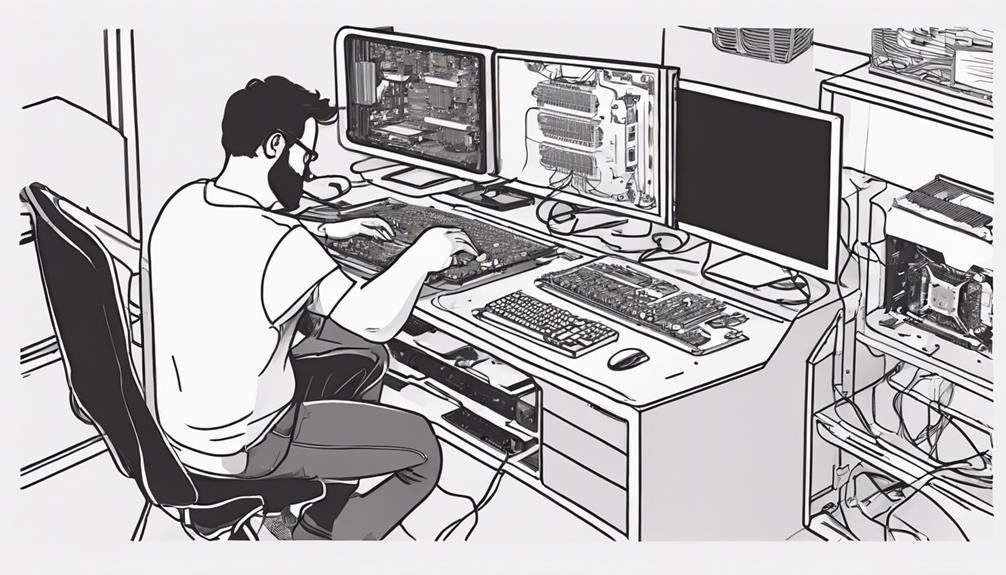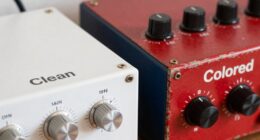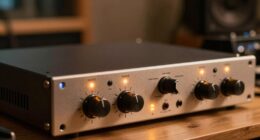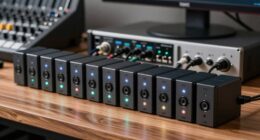Ready to start learning music production? Begin by choosing a genre that resonates with you. Research and invest in essential studio equipment. Set up your home studio with care, optimizing the space for productivity. Master the basics of your DAW and explore sound sources and VSTs for creative possibilities. Consider formal training for a structured education. Get hands-on experience through experimentation, collaboration, and mentorship. This is just the beginning of your music production journey, with so much more to discover and master along the way… Remember, persistence and consistency are key as you navigate the challenges and rewards of this creative journey. Don’t be afraid to seek out online tutorials, forums, and communities that can provide guidance on how to start music production and refine your skills. With dedication, you’ll unlock your unique sound and take meaningful steps toward achieving your musical goals.
Key Takeaways
- Choose a music genre that inspires you.
- Invest in essential home studio equipment.
- Learn the basics of a Digital Audio Workstation (DAW).
- Join online music production communities for support.
- Practice regularly and experiment with different sounds.
Choosing Your Music Genre
To commence your music production journey, start by delving into the music genre that resonates with you. Whether it's EDM, hip-hop, rock, or pop, selecting a genre that you're passionate about will guide your production style and techniques.
Explore the specific production techniques and gear commonly associated with your chosen genre to understand how to achieve the sound you desire. By immersing yourself in the history and key characteristics of your chosen genre, you'll gain a deeper appreciation and knowledge that will shape your creative process.
Exploring your chosen music genre won't only help you understand the unique elements that define it but also inspire creativity and passion in your production journey. Pay attention to the nuances of your genre to tailor your sound accordingly, making your music production experience both fulfilling and authentic to your artistic vision.
Researching Home Studio Equipment
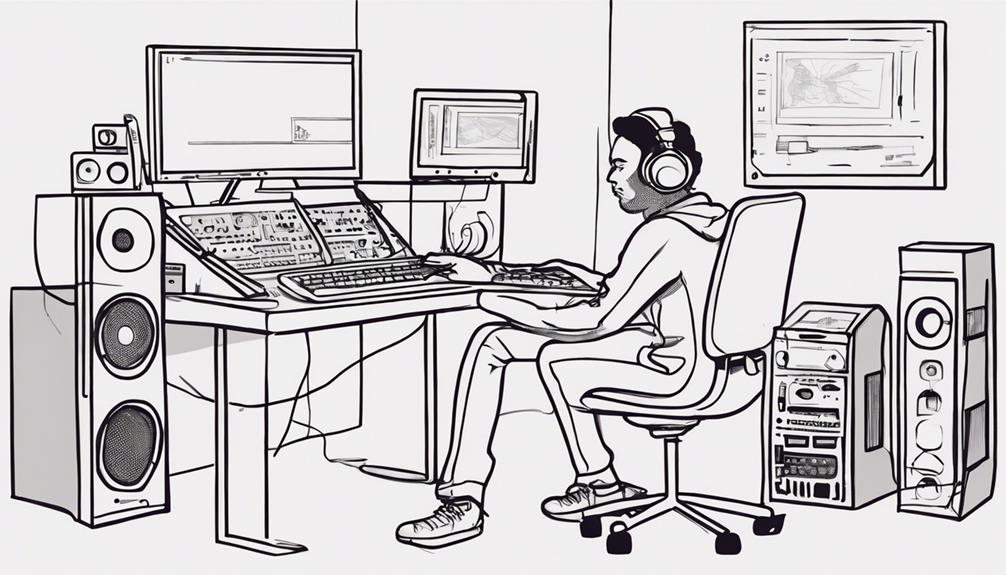
When setting up your home studio, it's vital to research essential gear types like audio interfaces, microphones, headphones, and studio monitors. Understanding how equipment compatibility aligns with your music genre will help you make informed decisions while staying within your budget.
Comparing features, reviews, and prices of different gear brands is key to selecting quality equipment that meets your music production needs.
Essential Gear Types
Researching home studio equipment for music production involves understanding the essential gear types required to set up a functional workspace.
In a home studio, key equipment includes:
- An audio interface for connecting instruments and microphones to your computer.
- Studio monitors for accurate sound representation during mixing and mastering.
- Headphones for critical listening and monitoring.
- MIDI controllers for tactile control over virtual instruments and DAW functions.
- Quality microphones for capturing vocals and instruments with clarity.
The audio interface serves as the bridge between your instruments and recording software, while studio monitors are important for ensuring your mixes sound good across different playback systems.
Headphones are essential for detailed monitoring, especially in shared living spaces.
MIDI controllers offer hands-on manipulation of sounds, enhancing creativity and workflow.
Quality microphones are essential for capturing high-quality audio recordings in your home studio setup.
Budget-Friendly Options
Explore cost-effective options when looking for home studio equipment to fit your budget constraints. To kickstart your music production journey without breaking the bank, consider affordable MIDI controllers and instruments to expand your creative possibilities.
Look for budget-friendly options when it comes to essential gear like audio interfaces, headphones, and studio monitors, comparing prices and features to make informed decisions. Additionally, sourcing sound packs, microphones, and VST plugins from cost-effective sources can enhance your production quality without overspending.
Prioritize learning, experimentation, and exploration within your budget limitations to maximize your resources effectively. By researching and investing in budget-friendly home studio equipment, you can build a solid foundation for your music production setup while staying mindful of your financial constraints.
Setting Up Your Home Studio
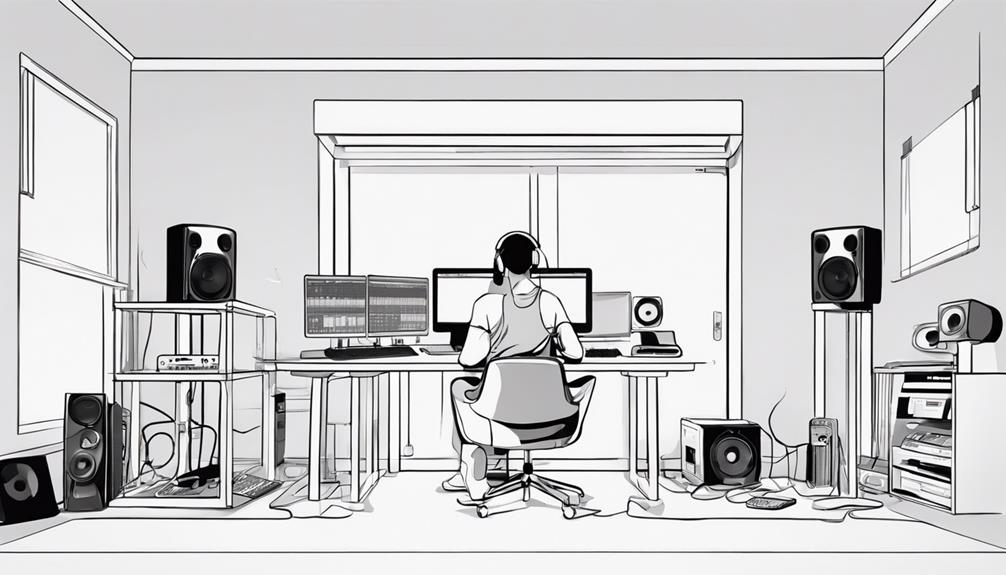
When setting up your home studio, it's vital to focus on essential gear like studio monitors, microphones, and audio interface. Consider acoustic treatment options to enhance sound quality in your space and invest in software and plugins for your music production needs.
These key points will help you create a productive and inspiring environment for your music production journey.
Essential Studio Equipment
To establish your home studio for music production, make sure you have the essential equipment like a computer, digital audio workstation (DAW), audio interface, studio monitors, and studio headphones.
Your DAW serves as the central hub for recording, editing, and mixing your music. An audio interface is key for connecting your instruments and microphones to your computer, ensuring high-quality audio recordings.
Quality studio monitors are important for accurate sound representation, aiding you in making informed mixing decisions. Additionally, studio headphones are necessary for detailed sound monitoring and editing, particularly in situations where loud monitoring isn't feasible.
Setting up your home studio with the right equipment is essential for producing professional-quality music. Invest in these foundational pieces to kickstart your music production journey and create a conducive environment for honing your skills.
A well-equipped studio not only enhances your workflow but also elevates the overall quality of your music productions.
Room Acoustic Treatment
Proper room acoustic treatment plays a crucial role in ensuring accurate sound reproduction within your home studio. Acoustic panels, bass traps, and diffusers are key tools for controlling sound reflections and absorbing unwanted frequencies in your room.
By strategically placing acoustic treatment at primary reflection points, you can enhance sound clarity and balance in your mixes. Factors like room size, shape, and materials can affect sound reflections, underscoring the importance of implementing acoustic treatment for excellent sound quality.
Investing in quality acoustic treatment can greatly improve the overall sound of your music production. Remember, achieving accurate sound reproduction in your home studio starts with effective room acoustic treatment using tools like acoustic panels, bass traps, and diffusers.
Software and Plugins
Consider selecting a digital audio workstation (DAW) like Ableton Live, Logic Pro, or FL Studio to kickstart your music production journey. These software platforms provide powerful tools for creating, recording, editing, and arranging music. When setting up your home studio, plugins play an important role in shaping your sound. Essential plugins for mixing and mastering include EQ, compression, and reverb plugins. Investing in quality studio monitors or headphones is essential to guarantee accurate sound representation in your productions. Additionally, incorporating hardware controllers like MIDI keyboards can enhance your workflow and creativity. To further expand your sonic possibilities, experiment with virtual instruments (VSTs) and sample libraries. Below is a table summarizing key elements for your home studio setup:
| Category | Recommendations |
|---|---|
| DAW | Ableton Live, Logic Pro, FL Studio |
| Plugins | EQ, Compression, Reverb |
| Studio Monitors | Quality monitors or headphones |
| MIDI Keyboards | Enhance workflow |
Mastering Your DAW Basics
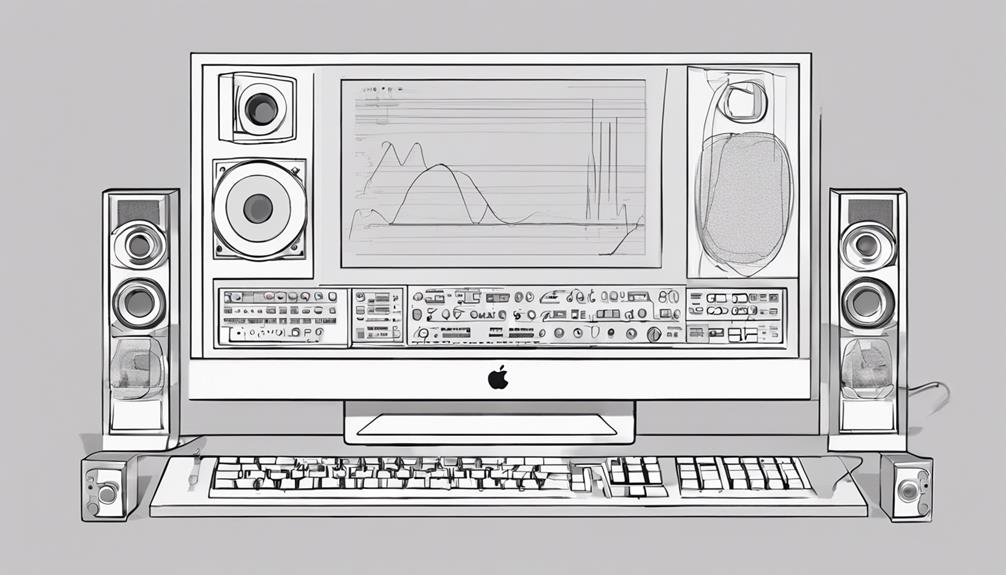
Master your Digital Audio Workstation (DAW) basics by familiarizing yourself with essential functions like recording, editing, and mixing to effectively navigate the software.
To excel in music production, mastering key features within your chosen DAW is essential. Explore track arrangement, automation, and plugin integration to streamline your workflow and enhance creativity.
Online tutorials and courses offer valuable insights into advanced DAW functions such as sidechain compression and bussing, helping you refine your skills. Remember to practice regularly to boost confidence in utilizing effects, virtual instruments, and MIDI capabilities seamlessly.
Experiment with different project templates and customization options to tailor your workspace and maximize productivity. By mastering these fundamental aspects of your DAW, you pave the way for a more efficient and rewarding music production journey.
Stay dedicated, keep learning, and enjoy the process of honing your craft.
Starting Music Production
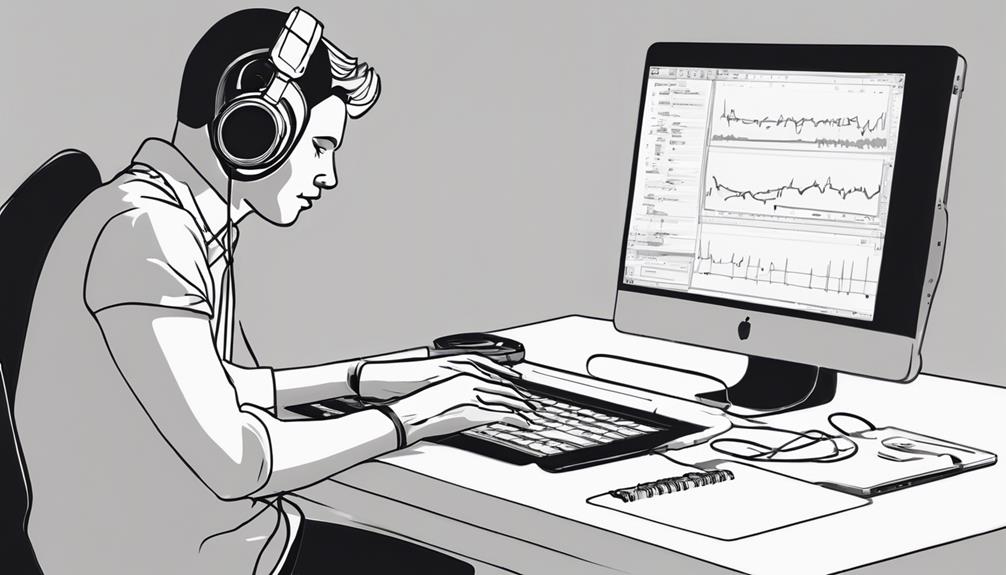
To kickstart your music production journey, begin by choosing a genre that resonates with your musical interests and aspirations. Whether it's electronic, hip-hop, or pop music, selecting a genre will help tailor your learning path and focus your efforts.
Invest in essential tools and equipment like a computer, audio interface, studio headphones, and a MIDI keyboard to set up your home studio effectively. These items will be fundamental in creating music and getting the most out of your studio time.
Next, explore Digital Audio Workstations (DAWs) such as Ableton Live, Logic Pro, or FL Studio. These software platforms are where producers work their magic, bringing sounds and ideas to life. Getting familiar with a DAW is important for starting music production and igniting your creativity.
Additionally, consider joining online music production communities or forums to connect with fellow producers, share knowledge, and seek feedback.
To conclude, take advantage of free online tutorials, courses, and resources to enhance your skills and knowledge in music production.
Exploring Sound Sources and VSTs

Begin your music production journey by exploring the world of sound sources and VSTs, essential tools that enhance your creative process and broaden your sonic possibilities. When delving into the domain of VSTs, you'll discover a plethora of virtual instruments that replicate real-world sounds with exceptional quality and fidelity. These digital audio workstations (DAWs) plugins offer a wide array of features to elevate your music production game. Here's what you need to know:
- VSTs Versatility:
VST plugins are incredibly versatile, offering a vast selection of customizable sounds and effects to suit your artistic vision.
- Sonic Exploration:
Virtual instruments within VSTs provide a diverse sonic palette, allowing you to experiment with different textures and tones for your music projects.
- Enhanced Creativity:
Considering Formal Training Options
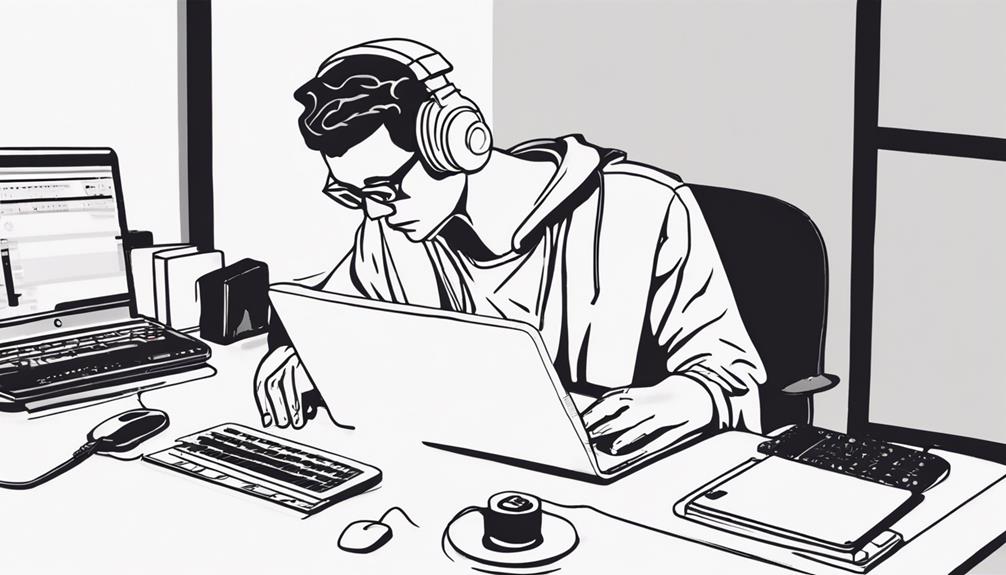
Considering formal training options for music production can provide you with valuable skills and industry connections essential for your growth in the field. Enrolling in a music production school such as AIMM can offer an immersive environment with experienced instructors, giving you hands-on education. These schools provide access to industry-standard tools and technology, enabling in-depth learning in music production. A formal music education not only offers structured learning paths but also opportunities for networking and collaboration within the industry.
For instance, OIART is known for providing industry-recognized training in audio recording, music production, and software like Pro Tools and Ableton Live. Their Audio Program features small class sizes, industry-leading instructors, on-site facilities, and post-grad support, ensuring a thorough educational experience.
Getting Hands-On Experience
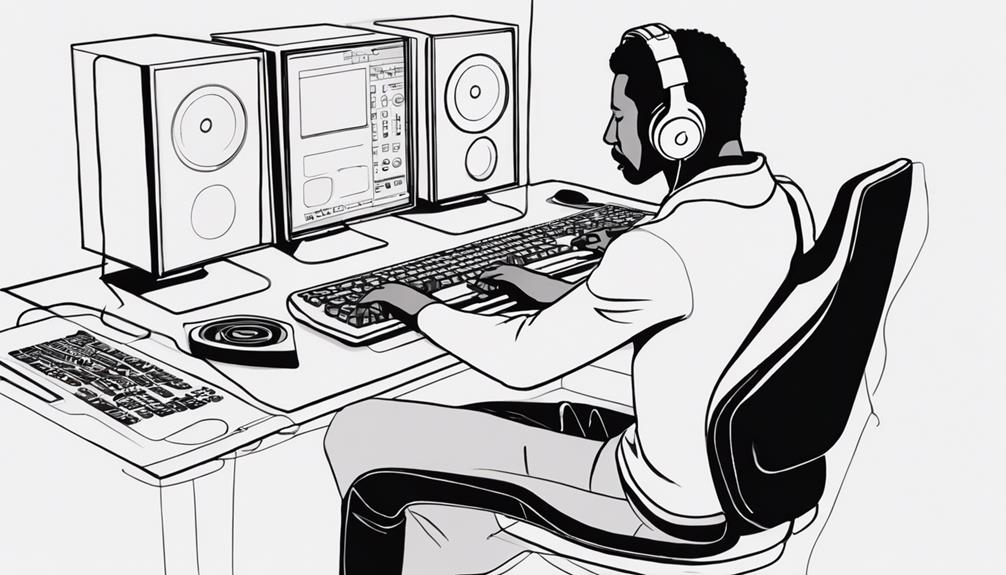
Setting up your home studio and regularly practicing will help you gain valuable hands-on experience in music production. To enhance your learning process further, consider the following:
- Experiment with Different DAWs: Try out various digital audio workstations (DAWs) to understand their unique features and workflows. This hands-on exploration will broaden your technical skills and creative possibilities.
- Collaborate with Other Producers: Working with fellow producers allows you to exchange ideas, learn new techniques, and receive constructive feedback. Collaboration not only expands your knowledge but also exposes you to different styles and approaches in music production.
- Attend Workshops and Seek Mentorship: Take advantage of music production workshops and events to enhance your skills and network with industry professionals. Additionally, seek mentorship opportunities with experienced producers to gain valuable insights, guidance, and support in your journey towards mastering music production.
Hands-on experience, combined with collaboration and mentorship, will accelerate your growth in this dynamic field.
Frequently Asked Questions
Can You Study Music Production With No Experience?
Yes, you can study music production with no experience. Engage in entry-level courses, explore online resources, and practice consistently. Dedication and hands-on learning are key to mastering production techniques. Start from scratch and watch your skills grow!
How Do I Teach Myself Music Production?
To learn music production on your own, immerse yourself in online resources for tutorials and courses. Practice regularly, explore different genres and equipment, solicit feedback from professionals, and participate in producer communities. Embrace the journey of growth and creativity!
What Is the Best Way to Learn Audio Production?
To learn audio production effectively, immerse yourself in hands-on practice with a DAW. Take online courses for structured learning. Engage in music production communities for feedback. Experiment with various genres. Set goals, practice regularly, and seek mentorship.
How Do I Start Myself as a Music Producer?
To start yourself as a music producer, select a genre, set up your home studio with gear, learn a DAW, and explore tutorials. Practice consistently, experiment, and seek feedback to improve and grow in your craft.
Conclusion
So, start your music production journey now! Explore equipment, set up your studio, master your DAW, and immerse yourself in creating music.
Don't forget to research genres, sources, and training options. Get grooving, get going, and get good at your craft.
Remember, practice makes perfect!

